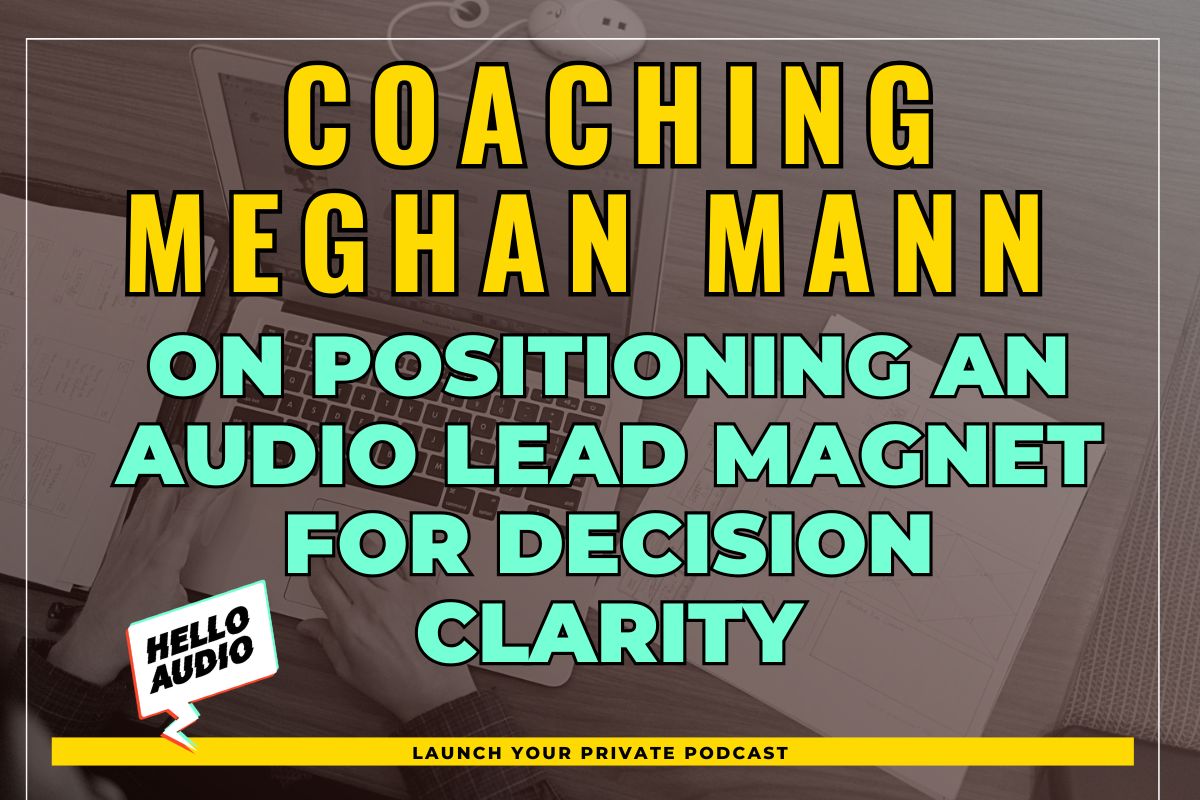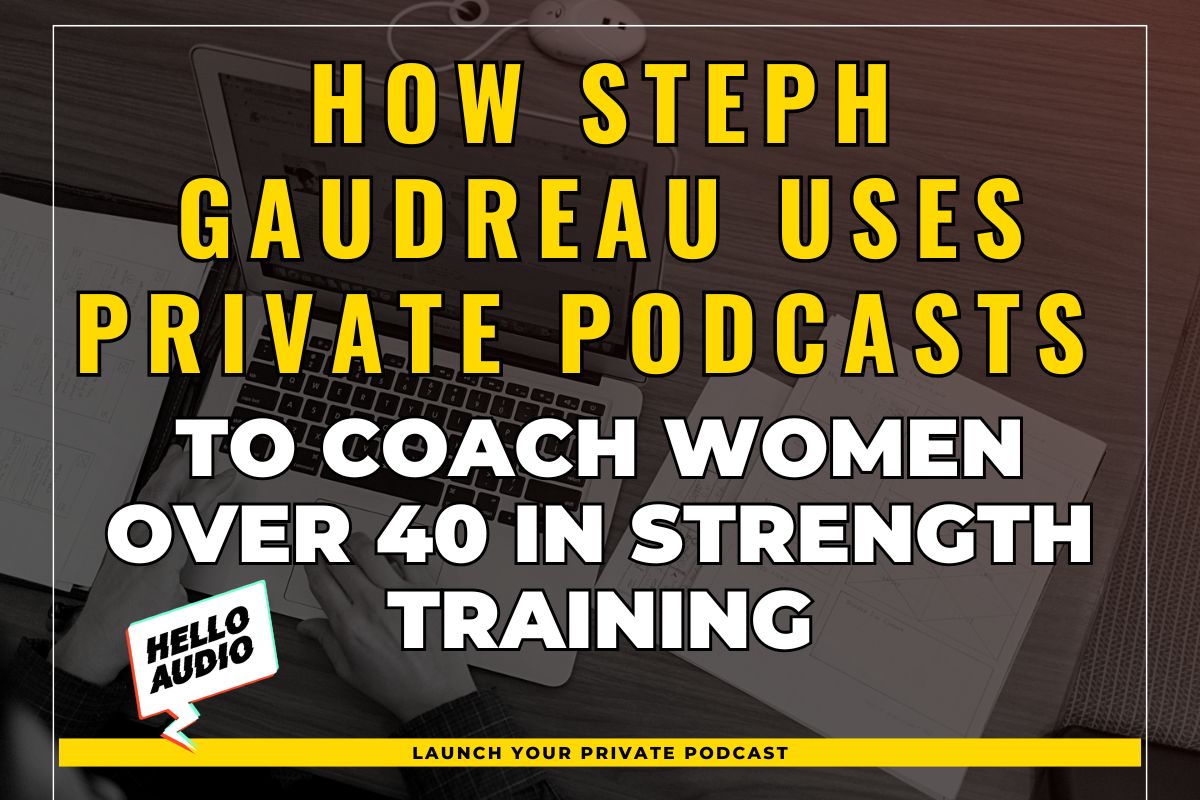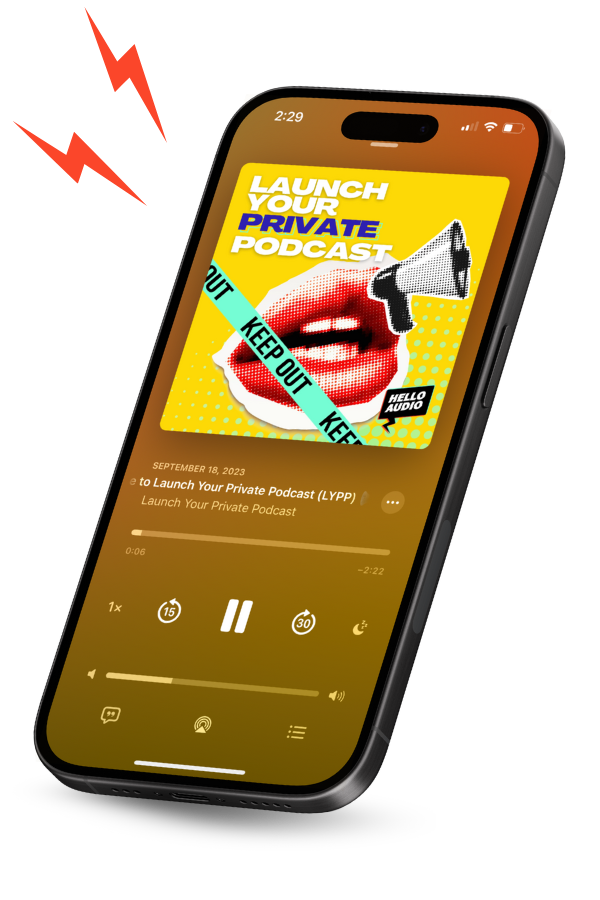Virtual events have emerged as powerful tools to connect with your audience, build brand awareness, and drive engagement—all without geographical limitations.
However, besides great content and technology, its success hinges on strategic marketing. Virtual event marketing is the key to drawing the right audience, maintaining their interest, and creating lasting impressions.
Our blog explains how to create a successful virtual event marketing and the tools you’ll need. We’ve also compiled +10 ideas to make your virtual events more appealing.
Want an effective way to promote your events?
Our tool lets you repurpose your existing content (including webinars and virtual events) into private podcasts. It also automatically sends your private audio feeds to listening apps like Spotify. You can add tags, control access, check your listeners’ analytics, and monetize your audio content.
Start a 7-day free trial to make your virtual events accessible to your audiences on the go, anywhere!
What is Virtual Event Marketing?
Virtual event marketing involves strategies for creating buzz around your upcoming event to get more attendees.
Here are some of its benefits:
- Get more organic leads
- Enhance your Return on Investment (ROI)
- Expand your brand’s reach and boost awareness
- Collect data to understand your target audience better
- Connect with your audience and build an online community.

How to Create an Effective Virtual Event Marketing Strategy
Your business must embrace a strategy to streamline event planning, maximize the impact of all types of virtual events, and achieve its goals.
Here are the 5 steps to develop a winning strategy:
1. Research the Target Audience
First, you must identify potential attendees’ demographics, interests, needs, and preferences. With audience insights, it’s easier to tailor your business’s event marketing efforts to provide personalized outreach and craft messaging that resonates.
2. Set Clear Event Goals
Set specific, measurable, realistic, and time-bound (SMART) goals to guide you in executing marketing strategies and measuring their success. Some common goals for virtual event marketing include creating brand awareness, driving engagement, and reaching a wider audience.
3. Plan Your Content
For a successful event, you must craft creative content to nudge the target attendees to sign up for the events and keep them engaged. Your content should also evoke emotions and be consistent across all platforms.
4. Promote Your Event
The next step should be to leverage popular platforms like Instagram, Facebook, and LinkedIn to generate interest in upcoming events. However, it is vital to pinpoint the social channels that your target audience uses to ensure efficiency.
If your audience is on the go and prefers audio content, you can reach them through private podcasts. Use our platform to repurpose your preexisting video and audio content into private audio feeds.
Want to see it in action? Start a quick demo.
5. Collect Data and Adjust Your Strategy Accordingly
Event marketing solutions like InEvents allow you to measure engagement, track attendance, and determine your brand perception. Surveys and feedback can help your marketing team determine whether your strategies are effective.

Virtual Event Marketing Ideas
Want your virtual event to stand out?
Incorporate these strategies and virtual event best practices to create excitement for your upcoming event, increase sign-ups, and build lasting impressions.
Here are the top 10 marketing ideas:
- Develop a Compelling Landing Page: Create exciting, branded landing pages that highlight key details of your event and allow a seamless registration process.
- Create a Promo Video: Share short snippets of the speakers, guests, venue, etc. Create teaser videos that communicate your brand’s personality and reveal its tone, atmosphere, and, most importantly, what your attendees should expect.
- Leverage SEO: Use content to inform and educate your target audience about the event. Further, incorporate target keywords to optimize the event website, landing page, and other marketing materials. This will boost your event’s exposure on search engines and drive organic traffic.
- Offer Incentives for Attending: Offer discounts, freebies, and early-bird pricing to encourage your attendees to register. Also, let your attendees participate in contests and giveaways to increase engagement.
- Utilize Strategic Email Marketing: Plan a sequence of emails that share helpful information with your target audience, such as schedule and registration deadlines.
- Use Social Media: With over 300 million Americans using social media, you can use several channels to create buzz, maximize reach, and engage your audience.
- Invest in Digital Ads: Run targeted ads on search engines and social media to ensure your event is visible to potential participants.
- Ask Speakers to Promote: Another excellent idea is to promote your speakers’ attendance at the event. Similarly, ask the speakers to generate interest within their community to tune in to that event.
- Team Up with Other Businesses: Collaborate with other brands or sponsors to reach a wider audience and co-promote the virtual event—however, partner with companies that align with your event goals.
- Consider Pre-Event Webinars: Hosting a free webinar can create interest and build trust. Remember to provide value and give your audience a sneak peek of the event while leaving them yearning to learn more.

Virtual Event Marketing Platforms
Marketing platforms make it easy for you to create your event and your attendees to find you.
Check out our top 4 picks:
1. Eventbrite
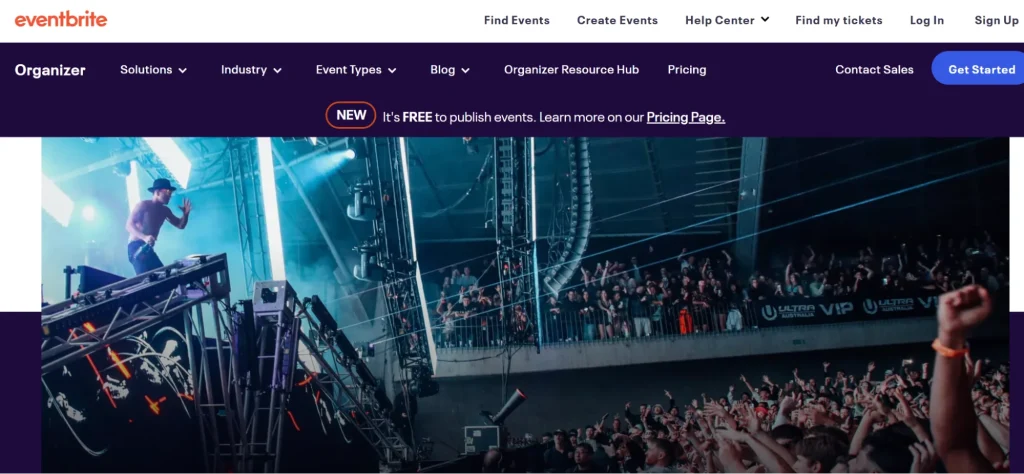
Eventbrite enables you to create and share events. It also makes it easy for people to find events that align with their passions and desires.
Some of its features include:
- An email marketing tool that automates and tracks campaigns
- Plenty of in-app advertising options to promote events and increase visibility
- Provides actionable insights and reports about your attendees and sales
- Allows customization of your event pages by adding images, videos, and custom URL
Pricing: Free for free events; paid events attract a 3.7% + $1.79 service fee per ticket.
2. vFairs
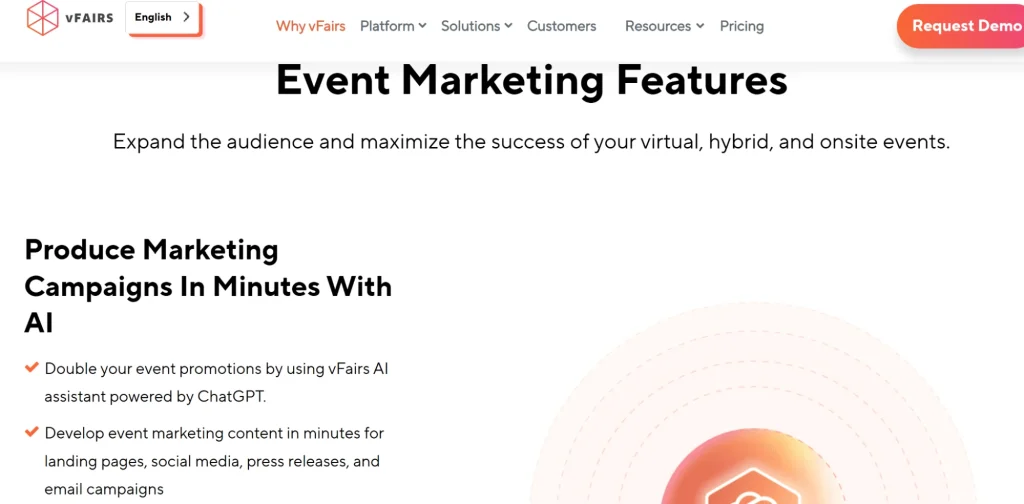
vFairs is another popular software with plenty of tools to help you build and promote virtual events to reach a broader audience, increase engagement, and build an active community.
Check out some of its features:
- Provides a mobile app to capture your attendees’ contact details and allow them to check in
- Integrates with apps like MailChimp, Zapier, and Salesforce, enhancing its functionality
- Easily engage attendees with interactive tools like live chat rooms and Q&As
- AI capabilities that simplify creating event marketing campaigns
- Quickly create branded landing pages and registration forms
- Track real-time insights on your attendance data
Pricing: No free plan; request for pricing.
3. BigMarker
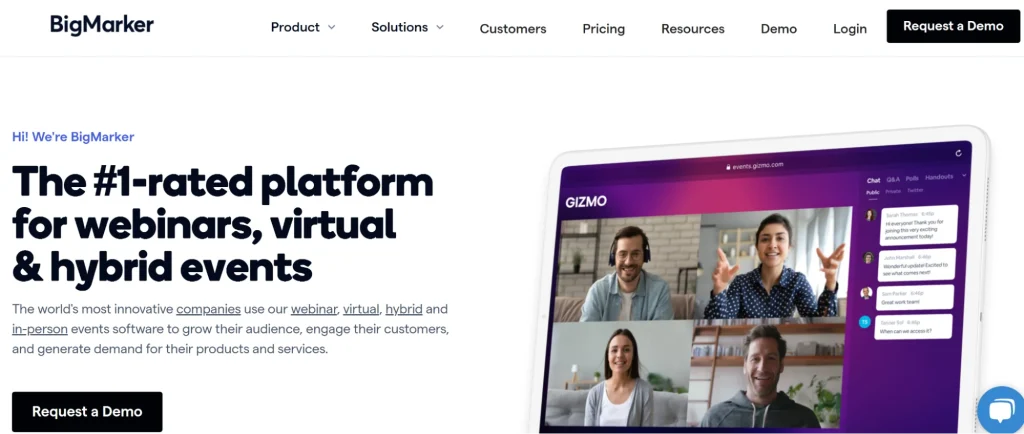
BigMarker allows you to host virtual events and provides built-in tools to promote them. With this software, you can build an online community.
It also:
- Generates reports and provides analytics on your attendees
- Lets you customize landing pages, email invites, and reminders
- Has live streaming and interactive video capabilities
- Allows you to embed forms and pop-ups
Pricing: Request a quote.
4. InEvent
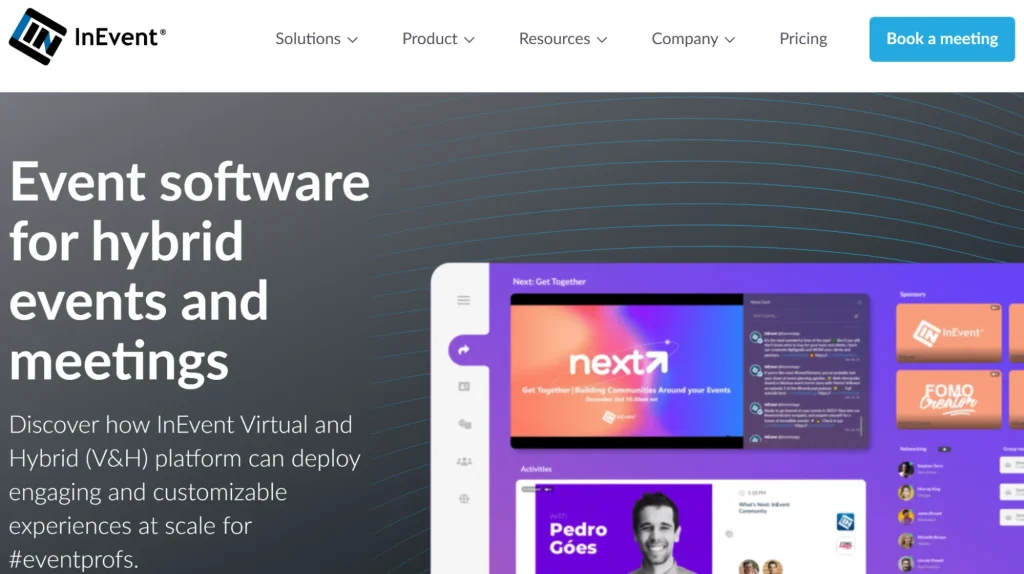
If you want a data-centric event marketing solution, InEvent should be your top pick.
Take a look at some of its key features:
- Plenty of interactive tools like Q&A sessions, forums, and live polls
- Analytics capability allows promotional material like videos to report back to CRMs, empowering sales teams to shorten the sales cycle.
Pricing: Provided upon request.
Quick Tip! You can leverage internal podcasting to keep your audience engaged before and after an event.
Hello Audio lets you repurpose media files (including past event videos) into private podcasts. It also auto-distributes private podcasts to your audience’s favorite listening apps, such as Spotify and YouTube Music (and more).
Our tool lets you access listener analytics, monetize your content, schedule shows, and receive payments.

Challenges in Crafting a Marketing Plan for Virtual Events
So, what are the biggest challenges to consider in light of current virtual event trends when creating your marketing plan?
Here are the top three you should keep in mind:
- Securing Sponsorships: Unlike onsite events, securing sponsors for your online event proves more challenging. Sometimes, sponsors and partners are skeptical of the benefits they’ll get from your virtual event.
- Identification of Target Audience: While virtual events are more effective because they don’t have time and physical constraints, it can be difficult to segment and identify the right audience.
- Driving Registrations and Engagement: Without a clear value proposition and ‘wow factor,’ it can be challenging to engage your attendees.

Frequently Asked Questions (FAQs)
Still have questions?
Check out the answers to commonly asked questions about virtual event marketing:
How Can I Measure the Success of My Virtual Event?
Your business can measure the success of its event marketing campaigns by tracking:
- Registrations and attendance
- Social media engagement
- Feedbacks and survey
- Return on Investment (ROI)
Can Virtual Events Be More Cost-Effective than In-Person Events?
Absolutely!
While in-person events attract significant costs associated with venues, virtual events help you to utilize virtual conferencing software that cuts venue costs, making them more cost-effective. Use our virtual events checklist to plan smart and make the most of your budget.
What Are the Top Mistakes to Avoid in Virtual Event Marketing?
The top 6 mistakes you should avoid in virtual event marketing are:
- Lack of a defined audience
- No clear goals and KPIs
- Impersonal invitations
- Lack of a virtual event marketing solution
- Limited engagement for your attendees
- Lack of a post-event follow-up strategy
- Unattractive landing page and follow-up content
Conclusion
And that is a wrap!
As we’ve seen, planning and maximizing the potential of virtual events requires a well-thought-out strategy and choosing the right platform. You should also incorporate different marketing ideas, such as creating teaser videos, using social media, and running paid ads.
Don’t forget to use private podcasts, too!
Our platform lets you create private podcasts from preexisting video and audio content in minutes. Then, our tool auto-sends the private podcasts so your audience can listen to them via popular podcast platforms like Spotify, Apple Podcasts, and more.
Further, our platform lets you manage access, monetize audio content, incorporate tags, and create targeted content.
Sign up for our 7-day trial and add value to your events.




